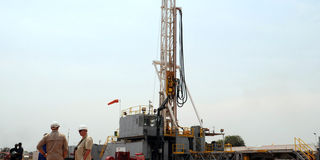Prime
Oil refinery to start operations in 2027 - govt

The refinery is expected to start operating two years after Uganda has achieved first oil in 2025. file PHOTO
What you need to know:
- The refinery, if realised within the stipulated period, will start operating two years after Uganda has attained first oil expected in 2025.
Energy Minister Ruth Nankabirwa has said Uganda’s oil refinery will start operations in 2027.
The refinery, which is expected to produce 60,000 barrels of oil per day, is expected to be built in Kabaale, Buseruka sub-county in Hoima District.
The refinery will also have support of a 211 kilometre long multi-products pipeline that will evacuate refined products such as petrol, liquefied gas, and kerosene to a storage terminal at Namwabula in Mpigi District.
Speaking during the launch of the National Oil Spill Contingency Plan in Kampala at the weekend, Ms Nankabirwa said the Albertine Graben Refinery Consortium (AGRC) has made significant progress in pre-final investment decision, noting that the consortium will expedite all pending activities so that the refinery’s final investment decision it undertaken.
In April 2018, government selected the AGRC as the private sector investors to finance, develop, construct, and operate the Greenfield oil Refinery estimated to cost $4b. “We plan to announce the final investment decision for the refinery probably next year. We are looking for an anchor investor, and therefore, the oil will come before the refinery is commissioned .. . in 2027,” Ms Nankabirwa said, noting Covid-19 had delayed fast tracking refinery activities.
Last month, after the announcement of the final investment decision for upstream oil projects, Ms Nankabirwa left for Italy to meet AGRC officials to discuss the status of implementation of the Project Framework Agreement.
AGRC is a private grouping made up of Baker Hughes General Electric - transacting through its subsidiary - Nouvo Pignone International, US based Africa focused infrastructure investor, Yaatra Africa, LionWorks Group, an Africa focused infrastructure investor that will provide additional financing, expertise and investment and Italian EPC contractor Saipem p.A that will design and construct the refinery.
Ms Nankabirwa said the consortium had already submitted the final Front End Engineering Design study, which sets it up to work closely with government to address comments about the report to facilitate approval of the Front End Engineering Design by the Petroleum Authority of Uganda
The Uganda Refinery Holding Company Limited, a subsidiary of Uganda National Oil Company Limited, will hold Uganda’s commercial interests of up to 40 percent.
Benefits of refinery
The refinery is expected to create between 40,000 and 50,000 jobs, support transfer of technology and skills and is a strategic project for the East African region.
The East African Community Refineries Strategy, 2008 recommended, among others, the development of a second refinery in East Africa in Uganda to support the other in Mombasa, which has since been shut down.
Government subsequently contracted Foster Wheeler Energy from UK in 2009 to conduct a feasibility study for the development of a refinery in Uganda.
The study was undertaken between 2010 and 2012 and it defined the key aspects of developing a refinery in the country such as the size and configuration, its location and financing as well as the market for the products to be produced.
The study also confirmed the economic viability of refining petroleum in Uganda hinged on serving the Ugandan market and other East African countries.
Uganda Bureau of Statistics data indicate that Uganda’s petroleum consumption has been growing at around 7 percent with 37,000 barrels consumed everyday.




